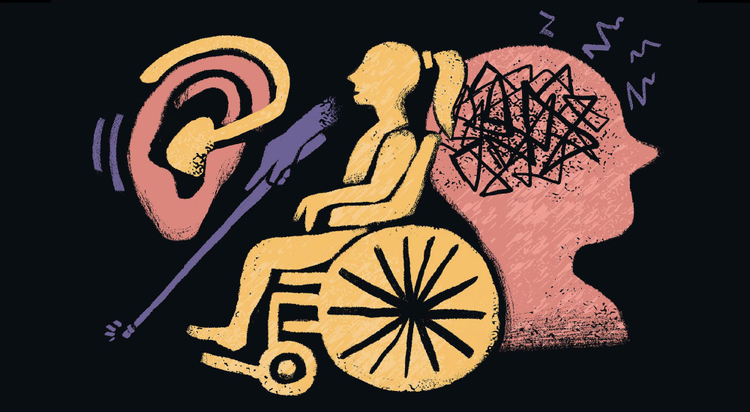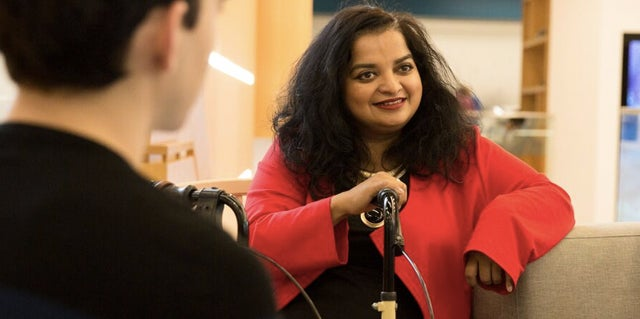Celebrating Access For All

Disabilities can look different from person to person, and some are not visible at all. Adobe strives to provide a supportive, inclusive environment with a variety of services for every employee.
In recognition of Disability Employment Awareness Month and in the pursuit of making the workplace accessible to all_, _three AccessAdobe employee network members spoke about their experiences and shared recommendations on how to respect and support others with disabilities.
Rani Mani, Head of Social Influencer Enablement

Rani’s physical disability requires her to use a walker, but that doesn’t hold her back.
Adobe provides services that make Rani’s day a little easier, such as dispatching security officers to walk her across the street and installing a button that helps her easily open the bathroom door on her floor. Rani appreciates when employees offer their help. However, she also suggests people respect the person’s independence.
“The worst thing about most disabilities is that it robs the individual of choice and control over many things in their life. For example, a well-meaning person might say to me, ‘Rani, why don’t you sit here since it’s closest to the door and easier for you to navigate?’ But what if I really wanted to sit someplace else in the meeting because of the flow of the presentation?” she said. “Helping people with disability retain choice and control can be a true gift.”
Some disabilities aren’t easy to detect, such as chronic pain, learning differences and mental health disorders, and people with these disabilities also deserve empathy and support.
“’Don’t judge a book by its cover’ is very appropriate for disabilities. I’m fairly certain that everyone is dealing with something that makes going through life challenging at times,” Rani said. “Like most things in life, there is no one-size-fits-all face, name or personality to disability. Stay away from assumptions and generalizations, but don’t stay away from the person because you don’t want to be awkward or offensive.”
Rakesh Paladugula, Computer Scientist, Software Apps

While living with vision impairment keeps Rakesh from doing certain things, it has never made him feel completely restricted.
“Life with disability is not doing different things, it is about doing things differently,” Rakesh shared. “A typical day for me is to challenge the challenges and complete my work for the day.”
Rakesh is able to tackle these challenges with Adobe’s support. This includes providing screen reading software such as Job Access With Speech (JAWS) and NonVisual Desktop Access (NVDA). These accommodations make his workday easier. “Since the day I joined, every request I have made to overcome challenges at work was heard and resolved,” Rakesh said.
If Rakesh needs extra help in the office, he isn’t afraid to ask, but he suggests that people observe and ask if a person with a disability needs help before assuming they need assistance. When supporting those with disabilities, it’s important to treat them like you would any other coworker.
“Disability is just a condition, treat them equal to anyone else. Just help them with the right accommodations to accomplish the task,” Rakesh said.
Lauren Gardner, Program Manager, Customer Experience

Lauren has cerebral palsy, a disorder of movement, muscle tone or posture, as well as a connective tissue disorder. This causes her to have poor balance as she walks around the office. “Any little crack in the pavement could mean a tumble. This includes walking on the shiny tile floors that are in most of our offices, because they catch the rubber on my shoes and trip me up,” Lauren said. A simple slip could cause her painful symptoms to flare up. Fortunately, Adobe has ways to support her.
“With flexible working hours and the option to work from home when needed, I can spread out my day to better manage my symptoms. It’s this sort of flexibility in the workplace that would allow many others to enter the workforce, and I am so grateful to have these options available to me at Adobe,” Lauren shared.
Just as the company supports employees with disabilities, coworkers can help too. Just ask and listen to what your colleagues need. “Be observant and listen; it’s OK to ask if I need help with something, but if I say no, I’d like to be heard,” Lauren said.
Adobe is proud to be an equal opportunity employer. We welcome and encourage diversity in the workplace regardless of race, gender, religion, age, ethnicity, sexual orientation, gender identity or expression, disability or veteran status. For a full list of our open opportunities, visit our career site!
Featured image by Wren Sauer